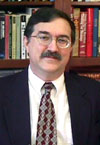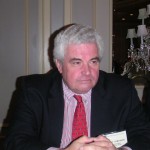I am saddened to share the news that Peter Schramm passed away Sunday, August 16, 2015. A full obituary and details of funeral arrangements are available at the Ashbrook Center website HERE.
It was during Peter’s tenure as president of The Philadelphia Society in 2010-11 that our board and membership began in earnest the important conversation about the well being of our Society that led us to a successful celebration of our 50th anniversary and beyond to a renewed energy and hope for the future. Peter did much to call us to a better vision of our fellowship, just as he called so many students to become more serious and more joyful about their intellectual and civic legacies as Americans.
I have been in awe over the past twelve hours to read the dozens of eulogies that Peter’s family members, students and colleagues have been posted to Facebook. I asked Dantan Wernecke if I could share his comments with you. He writes:
If you are a student of Peter W. Schramm, it is likely the first two books he had you read were the the autobiography of Winston Churchill, “My Early Life,” and the “Education of Cyrus” by the Greek writer Xenophon, a student of Socrates. Not Lincoln, not Jefferson, not Washington, Madison, Plato, Aristotle, Machiavelli, Shakespeare, Locke, or even the Declaration of Independence, and strange though it was, it was no accident. As new students to the study of politics, we were to read books by one of the greatest statesmen in history and a relatively obscure warrior-philosopher with a funny name. I won’t elaborate his point beyond mention, but unlike the soft-headed college freshman I was years ago, I think I know what this first lesson was intended to teach, or at least I know how I’ve wrestled with it each day since realizing its enormity. And this is the legacy of Peter Schramm. Not shelves of books or writings, but his students: walking, breathing legacies that both internalize and externalize the principles of equality, beauty, citizenship, and manliness he taught and demonstrated in his way, American ideas to be constantly on the minds of his students. It is a legacy that guarantees a renewing of freedom and humanity each time one of us does something good for another person.
Peter will be missed, but long will his spirit live on in those whose minds and hearts he took a role in shaping.
Take heart, Friends, and tonight lift your prayers and your glasses in memory and thanks that such a man as this was among us.
See also:
Larry Arnn’s reflections at National Review
Josh Distel’s reflections at Forbes.com
The amazing tributes at Peter’s Facebook page.






